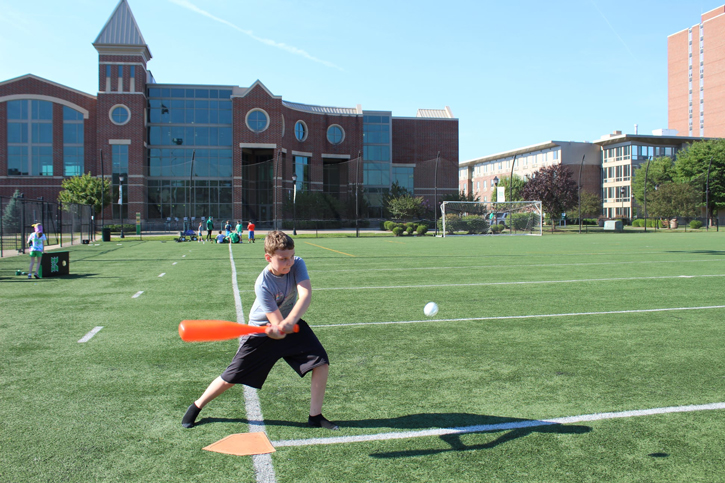The end of the school year is quickly approaching. That means campus rec departments are gearing up their summer camp offerings for youth participants. While most campers are registered, departments are still fine-tuning their staff and schedules.
Marshall University (Marshall) Campus Recreation’s Healthy Herd Youth Camp is currently in this stage of final preparations. Healthy Herd is an active, full-day camp complete with games, activities, swimming and lunch options for attendees. The camp is open for children ages 5-12.
Zach Kula, the assistant director of Programs: Competitive Sports, Camps and Outdoor Pursuits, said Marshall finds success in this offering thanks in part to student employees.
“They have a true desire to work with kids,” said Zula. “We hire under the philosophy that we can teach anyone to do the job, but we cannot teach you how to be a good person. Our campers and parents love our counselors. That is a big reason why kids return to our camp year after year. Word of mouth is very powerful in our community. Our supervisors are very good at pivoting and making sure there is very little dead time campers experience during the day.”
Kula detailed below his top tips in planning an effective campus rec summer camp.
Summer Camp Tips
1. It’s never too early to start planning.
Kula said every year at the end of camp he sits down with his student leaders to debrief. They discuss what went well, what didn’t, and what needs to be changed or added for next year. The team then documents and stores their findings.
“Having it available once the planning process begins again is crucial,” said Kula. “We start planning our weekly themes and schedules in November, if not earlier, for a Memorial Day week start of camp. Yes, we will make changes to that schedule as we get closer to camp time. But having the heavy lifting out of the way really helps us stay ahead of the game.”
2. Organization is Key.
Parents give campus recreation departments the privilege of looking after their children during summer camp. All departments must make sure anything they can control administratively is under control and easily to reference if needed. “Having folders to organize things such as registration packets, employee hiring, activities, etc. is good,” said Kula. “But they must be presented so you don’t find yourself wondering where or which folder information is stored in.”
3. Never stop hiring.
The Healthy Herd Youth Camp is a licensed childcare facility in West Virginia. Because of this, Kula said Marshall’s hiring is a very long process and takes around four weeks and 40 hours of training. They begin hiring in March and continue to do so all the way through camp.
“There is always a situation where students go on vacation and leave you shorthanded or one or two key pieces quit,” said Kula. “It also helps to hire individuals who are passionate or have a desire to be around children. Market to the right places like early childhood education, psychology departments and physical education. Know the demographic of students on campus who are trying to work with kids once they graduate and get them to come work for you.”
4. Make your parent resources transparent and easy to interpret.
Parents make the decisions on who they will trust with their children. By making their experience as easy as possible, they will be more likely to take advantage of your camp offering. Being transparent, having humanity and working to build a positive relationship with parents is important.
Kula said to use technology to your advantage. Understand the best way to communicate with your parents. Then, look to do so that way. At Healthy Herd, his student supervisors have the most interaction with parents. “They see them during every drop off and pick up whereas I only see them on occasion,” Kula said. “We focus on professional development with these students to make sure they understand our policy but also are able to respond tactfully to parents. If parents come to us with a complaint, we do our best to try to improve.
5. Be Flexible.
Understand even the best laid plans have the potential to go awry. Be ready to handle any new situations that come up and adapt on the fly.
6. Have strong professional relationships.
If you know you will need a lot of space in a particular facility, create a good relationship with that program area. Kula said to keep this relationship year-round to ensure it’s not one-sided. “Help other professionals where you can so when you need the pool, they are willing to work with you,” he said. “Give them information in the ways they prefer to make the request not as cumbersome. Work to get yourself face time with the key players to your success.
7. Install dynamic staff trainings.
Make sure your staff trainings are as interesting and captivating as possible. Having a boring training will cause your staff to zone out and not retain all the information. Kula said they bring in guest speakers to keep attention high. He recommended team-building exercises to better guarantee staff feel comfortable with each other and with professional staff.
8. Be Available.
Finally, make yourself available and make the communication with parents a priority. Avoid any surprises and don’t spring anything last minute on attendees and their families. “Make sure parents always can get your attention easily,” Kula said. “Be able to give them the response or communication they need in a timely manner. This is a major point to success and a priority for keeping our parents happy.”
Want more updates and information on campus recreation youth summer camps? Sign up for a digital subscription here.












